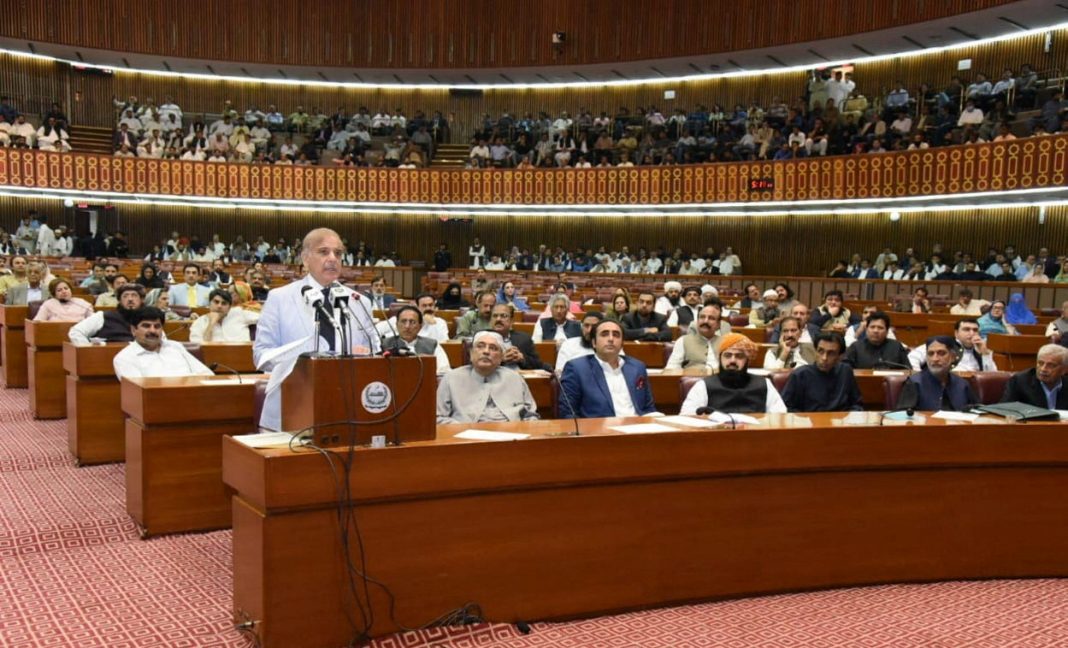A statement from Alvi’s office said he acted on the advice of the country’s Prime Minister Shehbaz Sharif in disbanding the lawmakers as the assembly’s five-year term is ending.
Usually, such a step is a formality and a general election would typically have to be held within 90 days. But this year there’s a twist. A delay until the spring is possible if Pakistan’s election commission opts for redistricting ahead of an election, based on the results of a recent census.
The uncertainty over the election date coincides with the legal and political drama surrounding Sharif’s predecessor and national cricket hero, Imran Khan. The 70-year-old popular opposition leader was convicted by an Islamabad court on Saturday of concealing assets and was sentenced to three years in prison.
Khan has appealed the conviction, which effectively removes him from the election campaign at a time when his party seemed to be doing well in the polls.
The Islamabad High Court, where his appeal is being heard, said Wednesday that it wants to hear from the government and Pakistan’s election commission before making a decision on whether to overturn the conviction and order Khan’s release.
The commission last year disqualified Khan from holding public office for five years, accusing him of unlawfully selling state gifts and concealing assets as premier. Khan was notified of his disqualification again on Tuesday, following his sentencing.
The court adjourned on Wednesday without setting a date for the next hearing, dealing a blow to Khan’s legal team which has argued he is being held in unacceptably tough conditions at Attock prison, about an hour’s drive from Islamabad. The court’s eventual ruling could be appealed and heard by Pakistan’s Supreme Court.
Since his arrest at his home in the eastern city of Lahore on Saturday, Khan met only once with one of his lawyers, Naeem Haider Panjutha, at Attock. Panjutha and other lawyers represented Khan in court Wednesday while the ex-premier remained in prison.
Arguing for Khan’s release, Panjutha said Khan did not violate any laws and that his arrest was illegal. “We were not properly heard today,” he later told reporters.
In a separate petition Monday, Khan’s team asked for his transfer to a prison with special cells for high-profile detainees, including politicians.
Khan, who was ousted in a no-confidence vote in April 2022 but remains a popular figure in the country, has denied the charges.
Meanwhile, Sharif addressed his last Cabinet meeting Wednesday. He stated he had faced multiple challenges, including the country’s worst economic crisis and devastating floods which killed 1,739 people and caused $30 billion in damage in Pakistan last summer.
Pakistan was able to negotiate a 3 billion bailout package with the International Monetary Fund, potentially saving the country from defaulting on its debt repayments.
Sharif then spoke to parliament, saying he would ask the president to approve the dissolution of the lower house which could pave the way for a parliamentary election by mid-November, but the government could delay the vote by several months if it decides to redraw constituencies first.
After the parliament is dissolved, the next step is for a caretaker government to be installed to run day-to-day affairs until the next election. Sharif exerts some influence over the selection of the caretaker prime minister but has not revealed his top choice. He will continue to work as premier until the caretaker prime minister is sworn in, likely this week.
Sharif’s ruling Pakistan Muslim League party is expected to face tough competition from Khan’s party — though Khan himself would be unable to take part unless his conviction is overturned. Under Pakistan’s laws, no one with a criminal conviction can lead a party, run in elections or hold public office.
Khan was previously arrested in May on corruption charges, triggering a wave of violent protests across the country. Pakistan’s Supreme Court ordered his release days later, saying his arrest was illegal.
Khan, since his ouster, has insisted that his removal from power was a conspiracy by Washington, Sharif and the Pakistani military — accusations that all three have denied.
